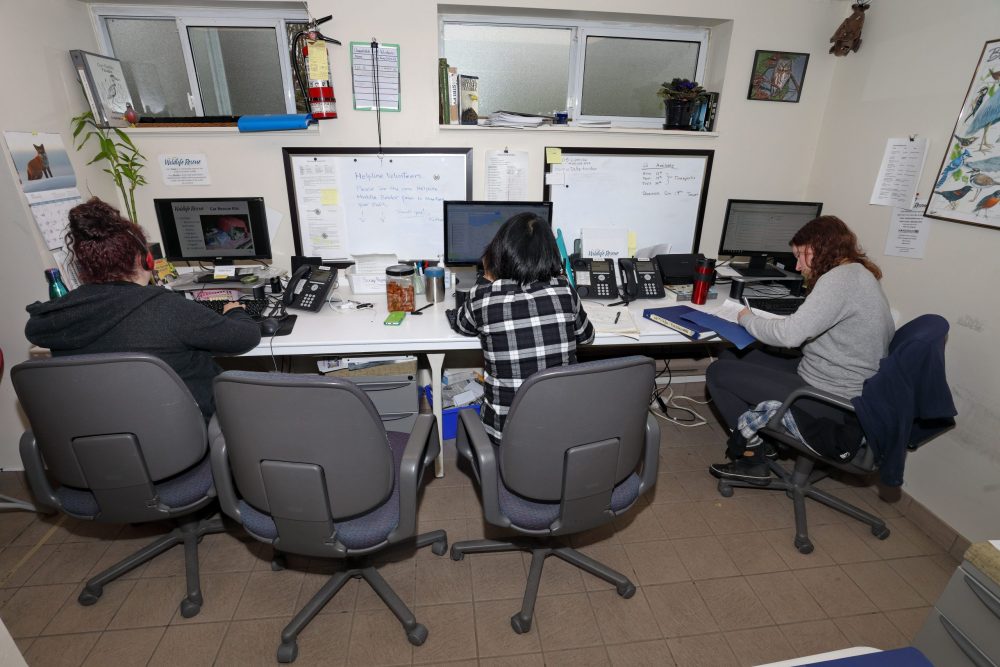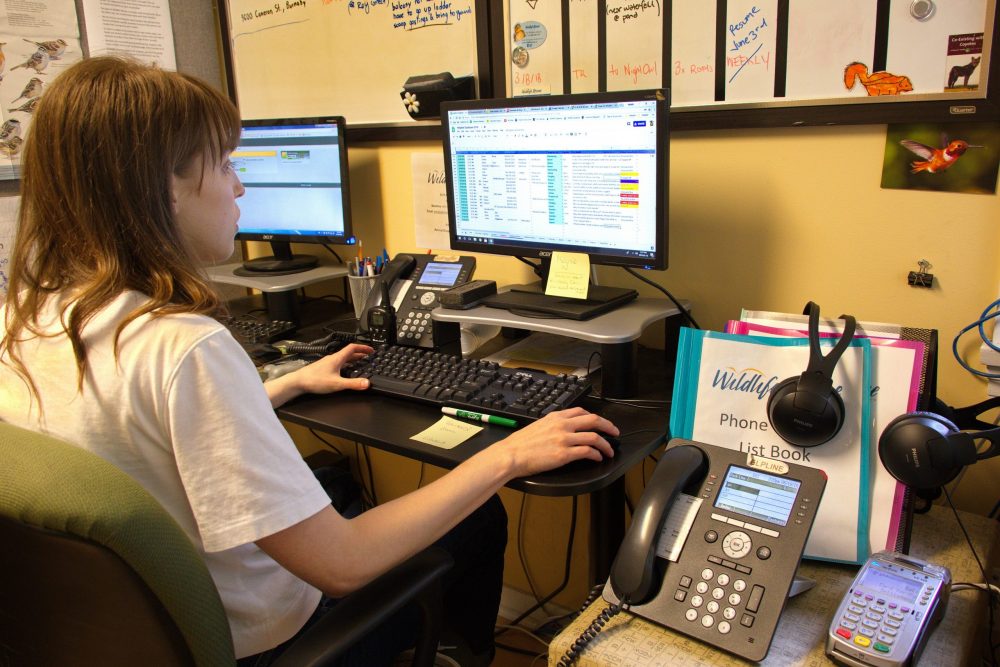Support Us
Since 1979 more than 140,000 animals have been treated by Wildlife Rescue.
Thanks to the support of individuals like you, Wildlife Rescue can provide a lifeline for animals in distress.
The Wildlife Support Centre and Rescue Assistant position is a fast-paced and exciting position designed to help staff manage daily responsibilities in the Support Centre during the busy summer months. Your main duties will include answering inquiries from the public, organizing rescues, admitting new patients, and educating the public on ways to co-exist with our local wildlife. You will receive up to 140 wildlife inquiries each day, send volunteers out on many interesting rescues, and admit thousands of injured and orphaned birds!
You may get tired of the phone’s ringtone, but you will never get bored of talking about our local wildlife. Once you start to learn more about the incredible animals we take in, you will want to pass that information on to everyone – advising concerned finders will become second nature. As a biology student, I personally became fascinated with all the information the staff and volunteers had to give and I found a new passion for birds that I never had before. I even found myself Googling more about birds on my days off. (Bird Nerd!)
I joined the Wildlife Rescue team as a CSJ a couple of summers ago, in the middle of finishing my Biology degree. I was a little worried that my limited background knowledge at the time would make it difficult, but quickly realized I had nothing to worry about. The team at WRA is incredibly helpful and works hard to make sure you are prepared and supported in your position. You will never feel alone. You will also quickly learn that the volunteers and staff members are full of knowledge to give when it comes to wildlife rehabilitation and conservation efforts – if you are looking to expand your biology expertise, this is the place for you.
This position is both challenging and inspiring. Many calls involve tough discussions about injured or nuisance animals. You will become an advocate for the animals while also empathizing with the callers and using the opportunity to educate on co-existing with wildlife. You will get difficult calls, but the good calls definitely outweigh the hard ones.
The compassion that many people show for these animals is incredibly humbling. Many finders will go above and beyond for the injured birds. During goose season, many people willingly surrender their balconies to goose families and spend weeks monitoring the birds from a distance to make sure they are healthy and safe. Some finders are willing to drive long distances to bring injured birds into us, others sacrifice their own comfort and use their personal sweaters to wrap injured animals in. The lengths that some people will go through to help our local wildlife is truly inspiring.
This position is perfect for someone with background experience in wildlife rehabilitation, or even a basic Biology education. If you are efficient with computers, have great people skills, and are willing to work in a fast-paced environment then this may be a suitable position for you. Even if you do not have any experience in the field, Wildlife Rescue is always looking for someone who is ready to be a part of a close team and is above all, driven and eager to learn.
Sierra Monastersky
CSJ Wildlife Helpline and Rescue Assistant 2018, 2019, 2020

Helpline Assistants working the phone lines and answering emails.
The Canada Summer Jobs program is an initiative funded by the Government of Canada to help young Canadians aged 15-30 gain practical work experience. The experiences gained through funded placements should further develop their skills and knowledge, preparing them to make a transition into employment. For more information, visit the Government of Canada’s website.

Helpline Assistant
Phone call, after phone call after phone call…our incredibly busy Helpline responds to approximately 28 000 calls per year, with the bulk of them coming in during the busy summer months.
Wildlife Helpline and Rescue Assistants (WHRAs) receive intensive training in natural history and urban wildlife challenges so they can help the thousands of people reaching out to our Helpline find solutions to their unique wildlife situations – from raccoons in the attic to orphaned ducklings walking down a busy street.
Answering the Helpline is an intense and rewarding position. One really NEVER knows what scenario will be on the other end of an incoming call, so if you enjoy problem-solving, collaborating and helping the public this is the position for you!
WHRAs always gain exceptional mastery and confidence in communications, a skill that readily transfers to any workplace environment. Additionally, because the phones are extremely busy WHRAs learn how to triage calls and manage detailed data efficiently, teaching them extraordinary time management.
During these strange pandemic times, many of us are craving interactions with others. The WHRA role provides an opportunity to (safely!) interact with many people on a daily basis, who are, for the most part, enormously grateful for our assistance. As this first point of contact for our organization WHRAs ensure that the public gets the information they need to help keep urban wildlife safe and to assist those patients that need medical attention in making their way to our wildlife hospital in a timely manner. It doesn’t get much more rewarding than that!
Jackie McQuillan,
Outpatient Care Lead
> Learn more about this position and how to apply here.